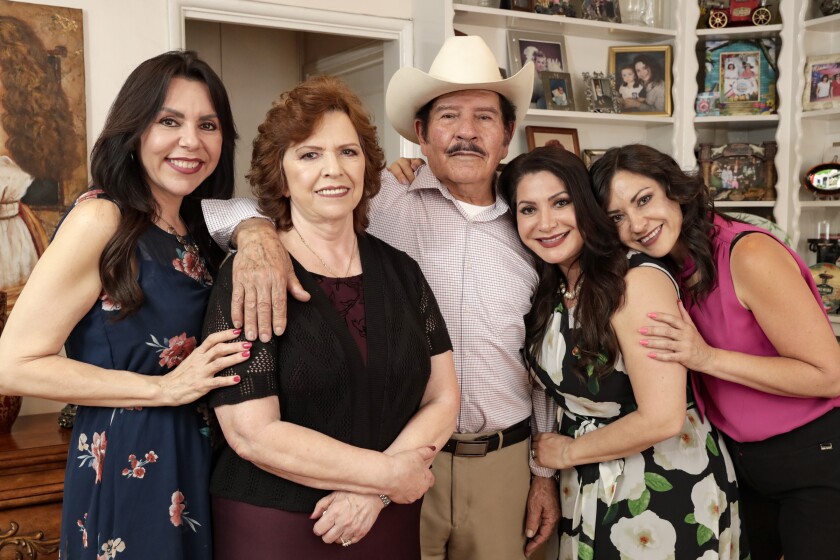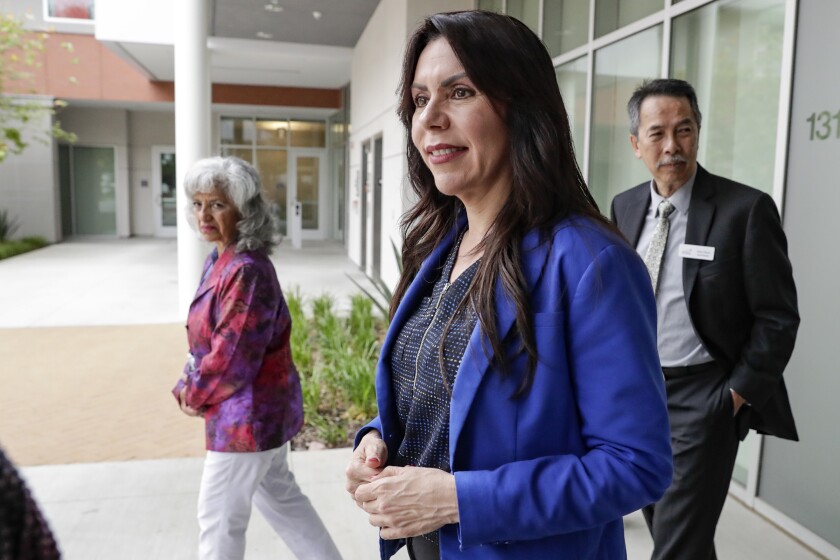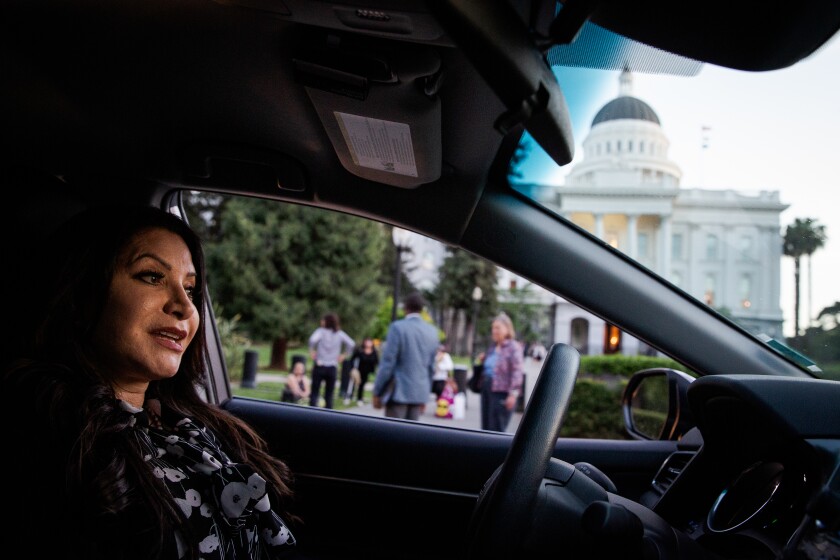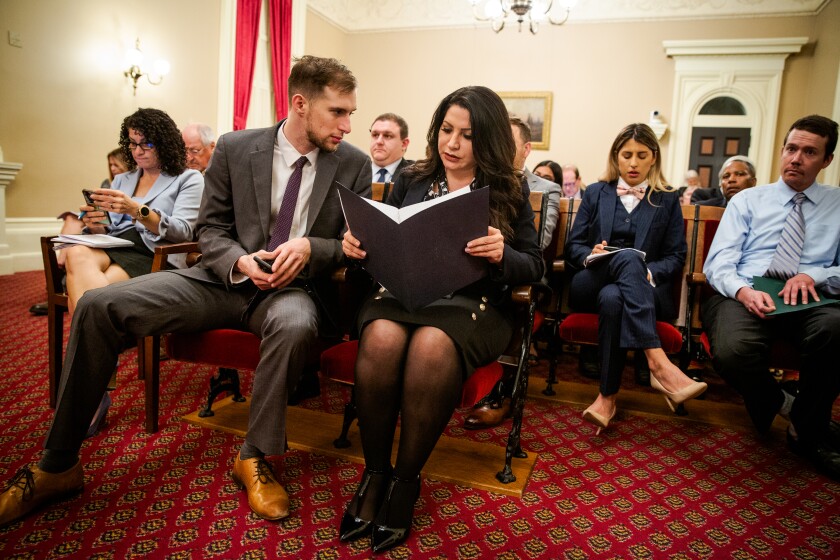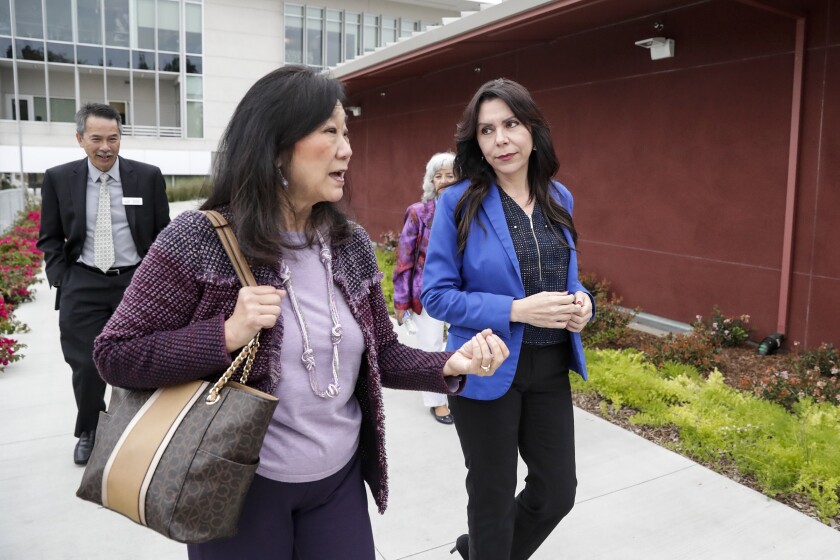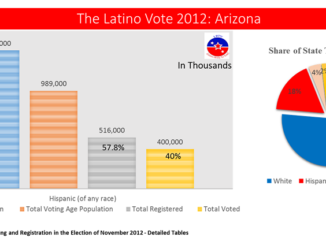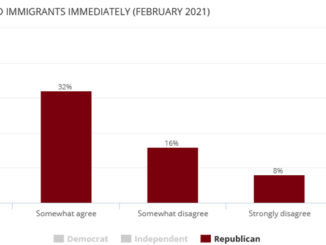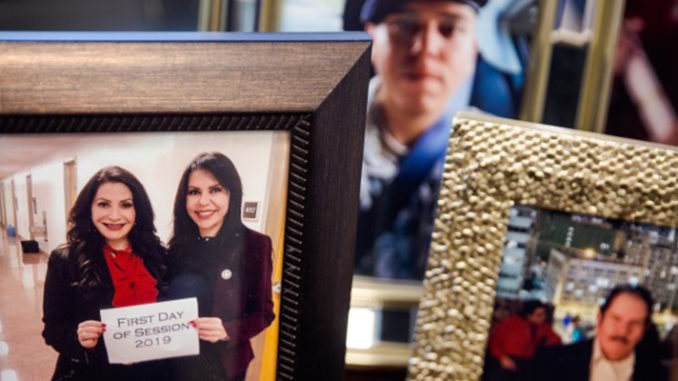
by Jazmine Ulloa
It was open house at Heron Elementary School, and inside a bustling auditorium, fifth-graders created a living wax museum of “Famous Americans,” decked out as pop icons, sports stars and legends from their history books.
Along with a miniature Barack Obama who tried not to fidget as he stood behind a makeshift presidential lectern, there was an Abraham Lincoln in a top hat (and checkered Vans), a bushy Albert Einstein and at least two sharpshooting Annie Oakleys.
Not far from a robed Sandra Day O’Connor stood an 11-year-old girl with long, brown hair, black slacks and a blazer. Like the others, she stood on a chair and remained motionless until you pressed a paper printout of a red button at her feet. Then she spoke:
“Hi, I am Blanca Rubio. The reason I am a famous American is because I am an assemblywoman, but not only that, it’s also because just recently my sister, Susan Rubio, got elected into the state Senate. Now we are the first sisters to ever be elected into the state Capitol.”
The speaker was Nadia Rubio, and she was portraying her mother.
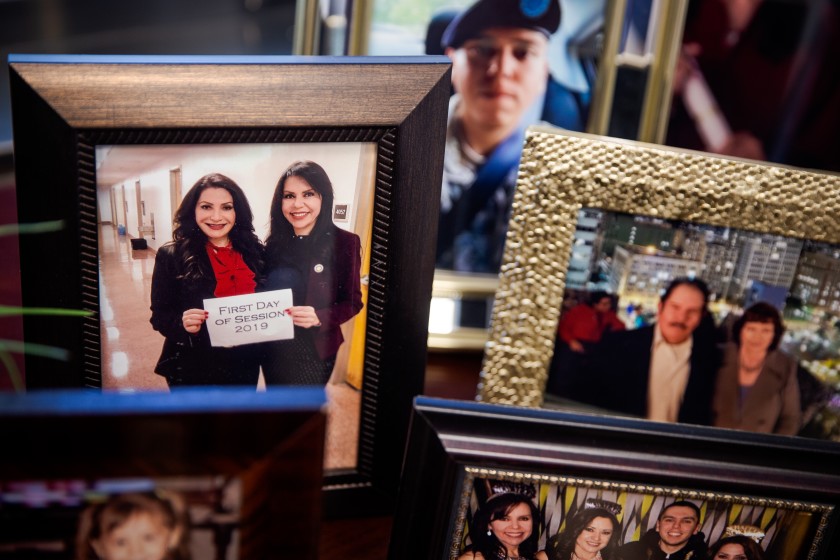
It seemed appropriate to share the story of Blanca and Susan Rubio in a school, because the lawmakers consider themselves teachers at heart. Animated and energetic, they tend to wave their hands when they talk, a habit from their days keeping children engaged.
In conversation, the Rubios suggest they are carbon copies of each other. But those working closest to them see a difference in styles: Blanca, 50, outgoing and blunt, is quicker to attract a circle of friends at events. Susan, a year younger, is a little more reserved and always meticulously organized.
Nadia, during the wax museum and in class last spring, recounted the sisters’ surprising journey:
“When I was 6, I got deported. I remember men in uniform coming up to my parents and terror in their faces.”
Blanca and Susan were born in Ciudad Juárez, the Mexican city opposite El Paso and then home to many braceros, field laborers granted temporary permits to work in the U.S.
Their father was a bracero, and when the program ended in 1964, Sabino Rubio continued to cross into the U.S. legally but was no longer authorized to work. He did so regardless, helping build highway overpasses across Texas. He later moved his wife and then four children to Winnie, outside Houston.
“We were fortunate enough that we had Mom and Dad. We recognized back then we were privileged in that respect.”
Blanca, then 6, and Susan, 4, were güeritas, light-skinned with blonde hair, and the only Spanish speakers in their classes. “The teacher didn’t really know what to do with me,” Blanca recalled. “She would put me in a corner and give me coloring pages.”
She slowly picked up English on the playground, but when she tried to sit with other students in class, the teacher sent her to the corner. She couldn’t speak well enough to advocate for herself, nor could her parents.
“It was the first time I experienced discrimination,” Blanca said. “I could understand. I just couldn’t speak the language.”
At a carnival in 1975, two immigration agents approached their father. The memories of family members differ on what happened next, but one thing is clear: They were deported.
The parents recall being granted permission to return home to pack before driving back to Juárez.
The children say they did not go back and left everything behind — the reason for a gap in their baby pictures. Susan is certain of it because she had kept a bottle filled with dimes and quarters, almost $10.
“Everyone would buy candy, and I decided to be the responsible one,” she said. “I had a goal. I was going to save and fill it up.”
She never got to spend the money.
“I really look up to my parents, and without them, I wouldn’t be here right now.”
Blanca says she will always remember their return to the United States: Aug. 16, 1977, the day Elvis Presley died. She was 7, and the country was in mourning.
They rode a train to downtown Los Angeles, where their father had already arrived after crossing illegally into the country again. Sabino had saved enough as a carpet factory worker to bring in his family, all without papers: his wife, Estela; with Blanca, Susan and her twin brother, Robert; and his youngest daughter, Sylvia. Brian would be born 15 years later.
In those days, Sabino often worked nights, taking three buses to the factory in the City of Industry. Estela became a housekeeper.
Their Pico Rivera neighborhood grew rougher with the years, with gangs and shootings. Yet, what the sisters remember most is how close they were as a family.
“We were fortunate enough that we had Mom and Dad,” Susan said, recalling how friends from fractured families often spent the night at their one-bedroom apartment. “We recognized back then we were privileged in that respect.”
Money was scarce, but there were weekend trips to the beach, picnics in the park. “Our mother wouldn’t let us buy anything during the week,” Sylvia said. “But when dad got paid on Fridays, they would take us to the market and we could each pick out one little thing.”
Blanca, as it often happens for the oldest child in immigrant families, assumed the role of protector and translator, even though she remembers hating her accent and dreading talking to clerks or ordering pizza. When her parents were away or at work, she enforced curfews. At Christmas, she wrapped the presents.
A sweeping immigration bill passed during the Reagan administration allowed Sabino and Estela to achieve citizenship. Then the U.S.-born Sylvia, though only 4, technically served as sponsor for her siblings. Blanca and Susan became citizens in 1994.
“I was a teacher for 16 years, and I was also on the school board and water board.”
It took Blanca time to find her calling as a teacher.
After a high school counselor dissuaded her from applying to universities — “Oh, honey, you’re just going to get married and have children” — she enrolled in community college but soon dropped out and began working at a statewide association for human resources professionals. Colleagues, seeing her potential, persuaded Blanca to return to school.
Blanca and Susan wound up graduating from East Los Angeles College on the same spring day in 1997, and they later completed master’s degrees at Azusa Pacific University. While at ELAC, Blanca had complained so much about a local water agency that a friend — the mayor of Carson — gave her a cliched motivational speech: “You can’t complain if you’re not going to do anything about it.”
Not long after that, her sister Sylvia gave birth to a son at a hospital next door to an elections office. Blanca took it as a sign and went inside to register as a candidate.
She became the youngest member to serve on the Valley County Water District board. As she dipped into the world of local politics, Blanca found an unexpected mentor, former Baldwin Park Mayor Jack White, whose family she and Susan had met at a city park when they were girls.
Blanca was working as a human resources specialist at the Baldwin Park Unified School District when, in 2000, administrators faced a teacher shortage. She thought back to her struggles as an English learner and the unhelpful counselor. Here was the chance to wield the influence, and power, of la maestra.
Three years later, White helped Blanca win election to the school board, and she had her first taste of a bitter political battle when she was accused of double dipping for simultaneously serving on two boards. She won a civil case over the matter but did not seek reelection to the water board.
While Blanca forged her way into politics and fell into teaching, for Susan it was the other way around.
Susan had long wanted to be a teacher. Once she became one, she saw how teachers were at the front lines of every social, emotional and economic issue facing families. At Blanca’s urging, she decided to attack those problems through public service. She was elected Baldwin Park city clerk in 2005, and four years later she successfully ran for City Council.
“I could always tell which kids in my class had not eaten, which had slept in their cars, which were having issues at home,” Susan said. “I became more involved in my community because I was an educator.”
But there was one student neither Blanca nor Susan could prevent from falling through the cracks. Unlike his sisters, their brother Robert was moved to a special education campus when he failed an English aptitude test upon their arrival in California. He grew emotionally withdrawn over the years, and eventually he and the family lost touch.
“I was always trying to protect him, and I feel like I failed in that duty,” Blanca said. In speaking up for others, the sisters often say, they’re speaking up for him.
“In 2016, I was elected into the Assembly, and just recently, my sister Susan Rubio got elected into the state Senate.”
It took time for Susan to find her voice.
Once again, she followed the lead of Blanca, whose rise to the Assembly coincided with the disintegration of Susan’s marriage.
In 2013, Susan married Roger Hernandez, an assemblyman and respected former West Covina councilman. When he was termed out, he and Blanca urged Susan to seek his old seat. Susan declined, so Blanca decided to run herself.
By then, the marriage was already on the rocks; Hernandez had filed for divorce just a year and a half after their wedding. By 2016, when Blanca launched her campaign, Susan obtained a temporary restraining order prohibiting Hernandez from stepping within 100 feet of her.
Court documents and witnesses in a divorce court hearing described Hernandez as a jealous man who often struck Susan and accused her of cheating, once wrapping a belt around her neck, another time holding a knife above her head. Photos in a thick court file show a hole punched in wall at their home and Susan’s bruised arm.
Political opponents accused the Rubios of hypocrisy, saying they had stood by Hernandez when another woman leveled abuse allegations against him years before. Critics insinuated Blanca knew about domestic violence but said nothing because it would hurt her candidacy, a charge she calls unfounded.
Susan says she was afraid to speak up because she was afraid of him.
Few political allies came to the sisters’ defense as Hernandez denied the claims. He dropped out of a race for Congress a month after a judge ruled there was enough evidence to issue a yearlong restraining order.
Blanca won the seat, even though she did not have the state Democratic Party‘s endorsement. She had billed herself as a moderate not beholden to the party establishment, hoping to attract independents and Republicans in the district encompassing East Los Angeles and parts of nearby cities. She also benefited from help by the California Charter Schools Assn., which spent close to $400,000 to further her candidacy.
Over the next year, the #MeToo movement rattled the Capitol as more than 140 women — Susan and Blanca among them — signed an open letter denouncing a pervasive culture of sexual harassment in politics. The flood of other women’s stories emboldened Susan, and in a 2017 op-ed in the Sacramento Bee, she wrote: “I had an image of what a battered victim would look like, but somewhere along the way the image transformed into my reflection. Victims are everywhere. Look and you will find us.”
Then, in 2018, a state Senate seat in the San Gabriel Valley became open. Susan ran and won.
“Now we are the first sisters to ever be elected into the state Capitol.”
The Bennets and Berryhills. The Sargents and McCarthys and Calderons. The list of brothers who served in the California Legislature goes on. But at Susan’s swearing-in ceremony in December 2018, Senate leader Toni Atkins (D-San Diego) heaped praise upon Sabino and Estela Rubio, “the only parents in California history who can say they have had two daughters in the Legislature.”
Charter schools, oil companies and business associations have been the sisters’ prominent donors. Some Latino Republicans say the Rubios seem a powerful alternative to a party that has turned off many Latinos with hateful rhetoric against immigrants.
At a fundraiser hosted by the Baldwin Park Women’s Club, Laura Santos, a trustee at Mt. San Antonio College, said she was cheering the Rubios on but was concerned they did not seem to share her progressive values. “We’re going to need to nudge them in the right direction,” she said with a wink.
The sisters say they are trying to represent all of California, with actions informed by personal experiences that mirror those of their constituents. When Blanca launched her Assembly campaign, a political consultant asked her, “What’s your story?”
She struggled to answer. She was a single mother of two, Blanca said, a teacher for 16 years, an elected official. The consultant wasn’t satisfied. “What’s your story?” he insisted.
Blanca started at the beginning: the family’s deportation, their struggles with English, their efforts to stay afloat. She then realized why their history hadn’t struck her as remarkable. “The reason it hadn’t been a story was because, in Los Angeles, everyone had the same story,” she said.
“I am very proud of what I have achieved, and I would hope to make a lot of great bills in the future.”
Blanca had six bills signed into law her first term and doubled that number in 2018. Her legislative record last session was mixed.
In October, Gov. Gavin Newsom vetoed her Assembly Bill 1590, which would have created a nonrefundable tax credit for first-time home buyers who are low- to moderate-income taxpayers. But Newsom signed AB 1645, which increases educational resources for high school and college students living in the country illegally.
Susan, in her first year, had at least nine bills come into law. Like the legislation proposed by her sister, her bills addressed issues with which she is intimately, even painfully, familiar. Newsom signed Senate Bill 273, which gives victims of domestic violence more time to report abuse. Another successful bill, SB 316, requires that institutions of higher education print the phone number of the National Domestic Violence Hotline on student ID cards.
Blanca and Susan have settled into the ebb and flow of legislators who shuttle between their districts and Sacramento, where 11-year-old Nadia and her brother, Aiden, attend school. The sisters bought a house with walls of pearl white stucco in a northwest suburb, and Blanca enjoys seeing her children so at ease among the kind of powerful people who intimidated her as a girl.
The Legislature will reconvene Jan. 6, with Blanca representing the 48th Assembly District as Susan serves the 22nd Senate District. They’ll be forging separate paths but, once more, still together.
Jazmine Ulloa covered California state politics and policy for the Los Angeles Times with a focus on criminal justice, immigration and tech privacy. Follow @jazmineulloa

